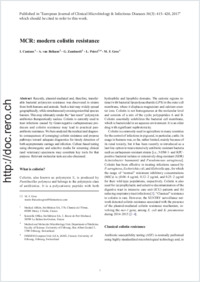MCR: modern colistin resistance
- Caniaux, I. Medical AffairsbioMérieux SA, Marcy L’Etoile, France
- Belkum, A. van Scientific OfficebioMérieux SA, La Balme-les-Grottes, France
- Zambardi, G. Scientific OfficebioMérieux SA, La Balme-les-Grottes, France
- Poirel, Laurent Medical and Molecular Microbiology Unit, Department of Medicine, Faculty of ScienceUniversity of Fribourg, Switzerland - INSERM European Unit (LEA, IAME, France)University of Fribourg, Switzerland
- Gros, M. F. Medical AffairsbioMérieux SA, Marcy L’Etoile, France
-
01.03.2017
Published in:
- European Journal of Clinical Microbiology & Infectious Diseases. - 2017, vol. 36, no. 3, p. 415–420
English
Recently, plasmid-mediated and, therefore, transferable bacterial polymyxin resistance was discovered in strains from both humans and animals. Such a trait may widely spread geographically, while simultaneously crossing microbial species barriers. This may ultimately render the “last resort” polymyxin antibiotics therapeutically useless. Colistin is currently used to treat infections caused by Gram-negative carbapenemase producers and colistin resistance may lead to practical pan-antibiotic resistance. We here analyzed the medical and diagnostic consequences of (emerging) colistin resistance and propose pathways toward adequate diagnostics for timely detection of both asymptomatic carriage and infection. Culture-based testing using chromogenic and selective media for screening clinical (and veterinary) specimens may constitute key tools for that purpose. Relevant molecular tests are also discussed.
- Faculty
- Faculté des sciences et de médecine
- Department
- Médecine 3ème année
- Language
-
- English
- Classification
- Biological sciences
- License
-
License undefined
- Identifiers
-
- RERO DOC 288707
- DOI 10.1007/s10096-016-2846-y
- Persistent URL
- https://folia.unifr.ch/unifr/documents/305524
Statistics
Document views: 118
File downloads:
- pdf: 439
